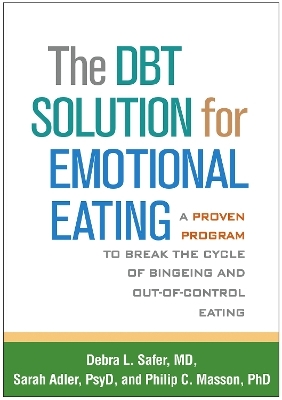
The DBT Solution for Emotional Eating
Guilford Press (Verlag)
978-1-4625-3302-2 (ISBN)
*Identify your emotional triggers.
*Cope with painful or uncomfortable feelings in new and healthier ways.
*Gain awareness of urges and cravings without acting on them.
*Break free from self-judgment and other traps.
*Practice specially tailored mindfulness techniques.
*Make meaningful behavior changes, one doable step at a time.
Vivid examples and stories help you build each DBT skill. Carefully crafted practical tools (you can download and print additional copies as needed) let you track your progress and fit the program to your own needs. Finally, freedom from out-of-control eating--and a happier future--are in sight.
Mental health professionals, see also the related treatment manual, Dialectical Behavior Therapy for Binge Eating and Bulimia, by Debra L. Safer, Christy F. Telch, and Eunice Y. Chen.
Debra L. Safer, MD, ABPN, is Associate Professor of Psychiatry and Behavioral Sciences at Stanford University School of Medicine and Codirector of the Stanford Adult Eating and Weight Disorders Clinic. She is a coauthor of Dialectical Behavior Therapy for Binge Eating and Bulimia (for mental health professionals) and The DBT Solution for Emotional Eating (for the general public). She has worked with hundreds of people with eating and weight concerns, with a particular focus on evidence-based treatment. Sarah Adler, PsyD, is Clinical Assistant Professor of Psychiatry and Behavioral Sciences at Stanford University School of Medicine and a clinical psychologist in private practice. Philip C. Masson, PhD, is on the Adjunct Clinical Psychology Faculty at Western University and is a psychologist practicing in London, Ontario, Canada.
Introduction
What You Will Learn in This Program: Preview of Upcoming Chapters
1. The DBT Approach to Stopping Binge Eating
2. Making a Commitment to Stop Binge Eating
3. Discussing Program Goals and the Tools to Get You There
4. Learning to Become Your Own DBT Coach
5. The Benefits of Dialectical Thinking and Mindfulness
6. Becoming a More Skillful Observer
7. Staying on Track
8. Mindful Eating and Urge Surfing
9. Being Mindful of Your Current Emotion and Radically Accepting Your Emotions
10. Reducing Vulnerability to Emotion Mind and Building Mastery
11. Building Positive Experiences: Steps for Increasing Positive Emotions
12. Distress Tolerance
13. Reviewing, Planning for the Future, and Preventing Relapse
Appendix. What Studies Form the Basis for This Program?
Resources
| Erscheinungsdatum | 31.01.2018 |
|---|---|
| Verlagsort | New York |
| Sprache | englisch |
| Maße | 178 x 254 mm |
| Gewicht | 660 g |
| Themenwelt | Sachbuch/Ratgeber ► Gesundheit / Leben / Psychologie ► Ernährung / Diät / Fasten |
| Sachbuch/Ratgeber ► Gesundheit / Leben / Psychologie ► Psychologie | |
| Geisteswissenschaften ► Psychologie ► Persönlichkeitsstörungen | |
| Medizin / Pharmazie ► Medizinische Fachgebiete ► Psychosomatik | |
| Medizin / Pharmazie ► Medizinische Fachgebiete ► Psychiatrie / Psychotherapie | |
| Sozialwissenschaften ► Soziologie | |
| ISBN-10 | 1-4625-3302-7 / 1462533027 |
| ISBN-13 | 978-1-4625-3302-2 / 9781462533022 |
| Zustand | Neuware |
| Informationen gemäß Produktsicherheitsverordnung (GPSR) | |
| Haben Sie eine Frage zum Produkt? |
aus dem Bereich


